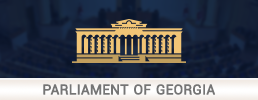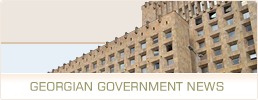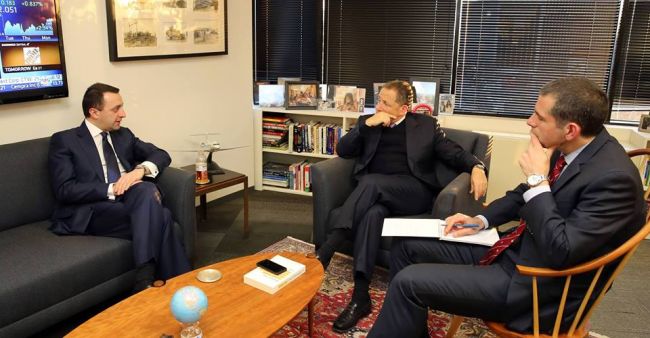When Irakli Garibashvili was a child, his native Georgia was just beginning to recover from decades as an impoverished Soviet satellite. Garibashvili's house had no electricity or gas, and he studied by candlelight. The newly independent country -- beset by chronic corruption, rampant civil instability, and lingering economic malaise -- wasn't doing much better.
Garibashvili is now Georgia's prime minister and, at 31, the youngest elected head of government in the world. His government's primary focus, Garibashvili told Foreign Policy in an interview, is developing closer economic and political ties with the European Union while laying the groundwork for eventually joining the North Atlantic Treaty Organization. His country was once firmly oriented east, towards its rulers in Moscow. Garibashvili hopes it will soon be just as firmly oriented west.
"I really want to transform my country into a real, modern, democratic, European state," he told FP, choosing his words carefully. "That's my dream."
Making that dream come true will require deftly finessing Tbilisi's relationship with Russia. With pro-Western leaders in nearby Ukraine struggling to find their way out from under Russia's thumb, Georgia's successes and struggles offer both a roadmap and a cautionary tale for Kiev.
The revolutionaries who now control Kiev, fresh off from ousting Ukrainian President Victor Yanukovych, seem certain to elect new leaders who are strongly committed to closer ties with both the EU and the United States. Top European Union officials have already traveled to Kiev to discuss the terms of a large package of financial aid, and the Ukrainian government has said it will soon ask the United States for a loan.
Russia reacted with fury to the moves, and Garibashvili is well aware of the risks of pushing Moscow too hard. Georgia's last president, Mikheil Saakashvili, took power in 2004 after the so-called "Rose Revolution" ousted the leader who had governed Georgia since it gained its independence in 1991. Immediately after the fall of the Soviet Union, Saakashvili began work to improve ties with the EU. and the United States, angering Russia. In 2008, Georgian troops fought a series of low-level skirmishes with separatist forces in the breakaway region of South Ossetia. Russia intervened on behalf of the rebels and pushed the Georgian forces out. Tbilisi and Moscow severed their diplomatic ties, and South Ossetia and Abkhazia have been under de facto Russian control ever since.
Saakashvili spent his final years in office futilely trying to persuade the West to help reclaim the lost provinces. Garibashvili, who took over as prime minister last November, has a very different strategy.
In his interview with FP, Garibashvili said that he hopes his country's increasing integration into Europe will gradually persuade the citizens of South Ossetia and Abkhazia that it would be in their own interest to rejoin Georgia. Tbilisi is slated to sign a so-called "association agreement" with the E.U. in August, bringing Georgia closer to full membership, and Garibashvili predicted that within the next five years Georgian citizens will be able to travel through the E.U. without visas and that the country's economy will be rapidly expanding because of growing trade with Europe. Residents of the breakaway regions, he believes, will want those perks for themselves.
"They will see the difference in living standards," Garibashvili said. "They will see how they live in Abkhazia and Ossetia, and they will see how Georgians live."
That entire strategy depends on how effectively Garibashvili will be able to realize his vision of Georgia as a regional business and economic hub. Georgia has long been known for its wine exports, but Garibashvili said his country is investing in new high-voltage lines capable of carrying hydroelectric power to Turkey. Garibashvili, speaking like the businessman he was before he becoming a politician, also boasts that his country offers political stability, a cheap labor force, and a pro-business regulatory structure. In the interview, he said he expected his country's economy to grow by at least 5 percent in 2014.
Garibashvili is well aware that a new flare-up with Russia would derail those plans, and he has worked hard to improve the strained relationship between the two countries by appointing a personal envoy to the government of Russian President Vladimir Putin and opening direct dialogue with Moscow.
Russian rhetoric about Georgia is noticeably softer than in the past, but it's clear that Putin isn't yet ready to let bygones be bygones. Garibashvili said that Russian forces have begun building 30 miles of barbed wire fencing along the border with South Ossetia. The work stopped in December, weeks before the start of the Sochi Olympics. On Tuesday, just after the closing ceremony, the work resumed. "That's crazy, right?" he asked in the interview.
Garibashvili is the first leader of a post-Soviet country who didn't grow up living under Soviet occupation, but he won't be the last. Some of Ukraine's next leaders will probably be roughly the same age and will probably have grown up with roughly the same sets of experiences. Georgia is closer to Iran and Iraq than it is to Paris and London. If Garibashvili succeeds, his country will be part of the EU. all the same. That accomplishment won't be lost on the young leaders gradually taking power across the former Eastern bloc. "We want to be an example," Garibashvili said in the interview. "We want to show the way."
Original:http://atfp.co/1hnU78c












